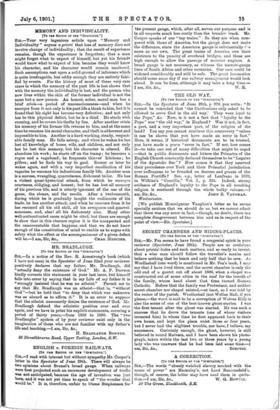MEMORY AND INDIVIDUALITY.
[To TIER EDITOR OF THE "SPECTATOR."] SIE,—Your very ingenious article upon " Memory and Individuality " argues a priori that loss of memory does not involve change of individuality ; that the result of experience remains, though the experience is forgotten; that a man might forget what to expect of himself, but yet his friends would know what to expect of him because they would know his character, and his character would remain unaltered. Such assumptions rest upon a solid ground of inference which is quite irrefragable, but oddly enough they are entirely falsi- fied by events. For the history of most of these very rare cases in which the memory of the past life is lost shows that with the memory the individuality is lost, and the person who now lives within the skin of the former individual is not the same but a new person. An honest, sober, moral man has a brief crisis—a period of unconsciousness—and when he emerges from it not only is his past life a blank to him, but it is found that his sight has become very defective; and not only has he this physical defect, but he is a thief. He steals with cunning, and he covers his thefts by lies. After another crisis his memory of his former life returns to him, and at the same time he resumes his moral character, and theft is abhorrent and impossible to him. Another is a hard-working, steady, respect- able family man. He falls asleep; and when he wakes he has lost all knowledge of home, wife, and children, and not only has he lost this memory, but his character is altered. He abandons his work ; he starts off on the tramp ; he becomes a rogue and a vagabond; he frequents thieves' kitchens ; he pilfers ; and he finds his way to gaol. Sooner or later he wakes again, and with a very imperfect recollection of his vagaries he resumes his industrious family life. Another man is a morose, wrangling, quarrelsome, dishonest tailor. He has a violent quasi-hysterical attack, from which he emerges courteous, obliging, and honest; but he has lost all memory of his previous life, and is utterly ignorant of the use of the goose, the shears, and the needle. After a twelvemonth, during which he is gradually taught the rudiments of his trade, he has another attack, and when he recovers from it he has resumed all his old skill, all his arrogance and quarrel- someness, and, alas ! all his dishonesty also. Many other well-authenticated cases might be cited, but these are enough to show that in this obscure region it is the unexpected and the unaccountable that happens, and that we do not know enough of the constitution of mind to enable us to argue with safety what the effect or the accompaniment of a given defect


















































 Previous page
Previous page